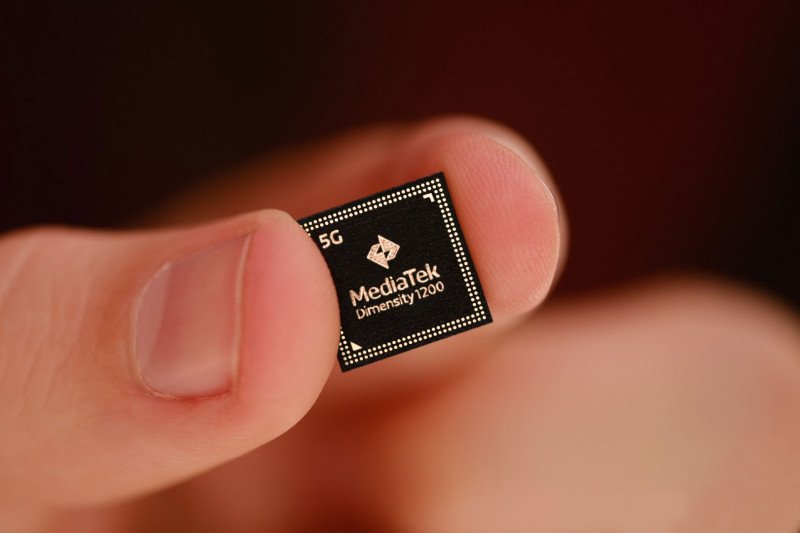Global semicondutor company MediaTek unveiled the latest Dimensity 1200 and Dimensity 1100 5G smartphone chipsets with AI, camera and multimedia features to support even more powerful 5G technology. The addition of the 6nm Dimensity 1200 and 1100 chipsets to MediaTek’s 5G portfolio provides a range of options for tool or device makers to design high-powered 5G smartphones with enhanced camera, graphics and connectivity features.
“MediaTek continues to expand its 5G portfolio with integrated solutions for a wide range of devices from high to middle class,” said MediaTek’s Corporate Vice President and General Manager for Wireless Communications, JC Hsu.
“The Dimensity 1200 is supported by a 200MP camera and more advanced AI capabilities, in addition to innovative connectivity, display, audio and game enhancements,” he continued.
The Dimensity 1200 and 1100 pack a 5G modem that is integrated with MediaTek’s 5G UltraSave technology for huge power savings. The two chipsets support every generation of connectivity from 2G to 5G, apart from supporting the latest connectivity features including 5G standalone and non-standalone architectures, 5G operator aggregation (2CC) across frequency division duplex (FDD) and time division duplex (TDD), dynamic spectrum sharing. (DSS), True Dual SIM 5G (5G SA + 5G SA) and Voice over New Radio (VoNR).
The chipset also integrates the 5G HSR Mode and the 5G Elevator Mode enhancements to ensure a smooth and reliable 5G connection across the network. For multimedia, the Dimensity 1200 supports 200MP for photography with a five-core HDR-ISP, making 4K HDR video recording for a much greater dynamic range. This chipset integrates the latest version of the MediaTek hexa-core AI processor (MediaTek APU 3.0), which has an enhanced multi-task scheduler that is claimed to reduce latency and improve power efficiency. Meanwhile, the Dimensity 1100 packs a 108MP camera capability, and integrates with the APU 3.0 for power-efficient, high-performance computing.
Both chipsets support AI camera features including AI-Panorama Night Shot, AI Multi-Person Bokeh, AI noise reduction (AINR) and HDR capabilities. The chipset also supports new AI-enhanced video playback features including AI SDR-to-HDR. Performance-wise, the Dimensity 1200 features an octa-core CPU designed with an ultra-core Arm Cortex-A78 up to 3GHz for extreme performance, three Arm Cortex-A78 super cores, and four Arm Cortex-A55 efficiency cores. Meanwhile, the Dimensity 1100 is designed with an octa-core CPU that includes four Arm Cortex-A78 cores operating up to 2.6GHz and four Arm Cortex-A55 efficiency cores, along with a nine-core Arm Mali-G77 GPU.
Both chipsets are manufactured using TSMC’s 6nm process technology. Furthermore, for screen displays, Dimensity 1200 supports a refresh rate of 168Hz, while Dimensity 1100 supports a refresh rate of 144Hz. Both chipsets support MediaTek’s HyperEngine 3.0 gaming technology, plus multi-touch boost touch screen responsiveness.
The new chipset also supports beam tracking in mobile games and artificial reality applications for more realistic visuals, along with hotspot power savings that allow users to spend longer between charges. The Dimensity 1200 and 1100 support Bluetooth 5.2, which allows users to stream to multiple wireless devices simultaneously. The chipset also supports ultra low latency true wireless stereo audio and LC3 encoding for higher quality, low latency streaming audio that’s also very power efficient to extend the battery life of the wireless earbuds. Dimensity 1200 has received TÜV Rheinland certification for its 5G performance, with real testing covering 72 scenarios. A number of OEMs, including Xiaomi, Vivo, OPPO and realme, have expressed support for the new Dimensity chip from MediaTek.
The first devices with the new MediaTek Dimensity 1200 and 1100 chipsets are expected to hit the market in late Q1 and early Q2 of this year. Apart from that, other industry collaborators also support MediaTek 5G chipsets including Arm, China Mobile, Tetras.AI, ArcSoft and Tencent Games.

